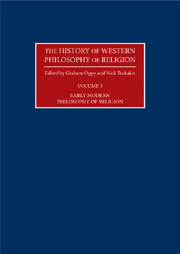Book contents
- Frontmatter
- Contents
- Editorial Introduction
- Contributors
- 1 Early Modern Philosophy of Religion: An Introduction
- 2 Niccolò Machiavelli
- 3 Martin Luther
- 4 John Calvin
- 5 Michel de Montaigne
- 6 Francisco Suárez
- 7 Thomas Hobbes
- 8 René Descartes
- 9 Ralph Cudworth
- 10 Blaise Pascal
- 11 Baruch Spinoza
- 12 John Locke
- 13 Gottfried Wilhelm Leibniz
- 14 George Berkeley
- 15 Voltaire
- 16 The Deists
- 17 Jonathan Edwards
- 18 Thomas Reid
- 19 David Hume
- 20 Denis Diderot
- 21 Immanuel Kant
- 22 Gotthold Ephraim Lessing
- 23 William Paley
- Chronology
- Bibliography
- Index
2 - Niccolò Machiavelli
- Frontmatter
- Contents
- Editorial Introduction
- Contributors
- 1 Early Modern Philosophy of Religion: An Introduction
- 2 Niccolò Machiavelli
- 3 Martin Luther
- 4 John Calvin
- 5 Michel de Montaigne
- 6 Francisco Suárez
- 7 Thomas Hobbes
- 8 René Descartes
- 9 Ralph Cudworth
- 10 Blaise Pascal
- 11 Baruch Spinoza
- 12 John Locke
- 13 Gottfried Wilhelm Leibniz
- 14 George Berkeley
- 15 Voltaire
- 16 The Deists
- 17 Jonathan Edwards
- 18 Thomas Reid
- 19 David Hume
- 20 Denis Diderot
- 21 Immanuel Kant
- 22 Gotthold Ephraim Lessing
- 23 William Paley
- Chronology
- Bibliography
- Index
Summary
Some seventy-five years after the death of Niccolò Machiavelli (1469–1527), Francis Bacon lauded the author of The Prince and The Discourses for having the confidence to charge “in almost plain terms” that the Christian faith had left “good men” to the predations of those that are “tyrannical and unjust” (Bacon 2002: 363). That Machiavelli deserved credit for his writings on the political failures of Christianity was a view that other thinkers of Bacon's time and stature did not share; nor would it be the verdict of commentators for many centuries to come. In fact, on issues concerning religion, Christianity, morality and politics, Machiavelli was and “to some extent remains”, as Najemy (1999: 659) observes, “a convenient scapegoat often blamed for the decline of religion in the modern world”. Within Machiavelli studies, however, the question of the Florentine's view of religion is by no means settled, much less reducible to a version of paganism or devilish immorality. Rather, the religion question in Machiavelli remains a multifaceted problem eliciting among scholars a wide range of arguments, interpretations and debates. In what follows, we shall turn to Machiavelli's two most significant works of political theory, The Prince (1532) and, more extensively, Discourses on the First Ten Books of Titus Livy (1531), to assess the continuing scholarly interest and political significance of Machiavelli's treatment of religion.
- Type
- Chapter
- Information
- The History of Western Philosophy of Religion , pp. 19 - 32Publisher: Acumen PublishingPrint publication year: 2009

